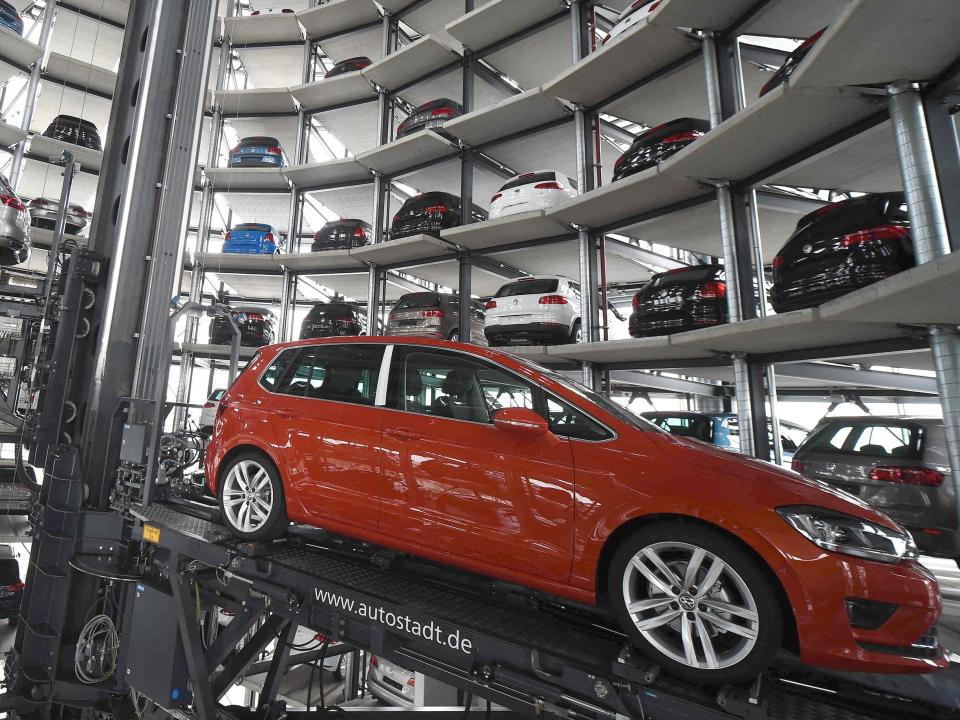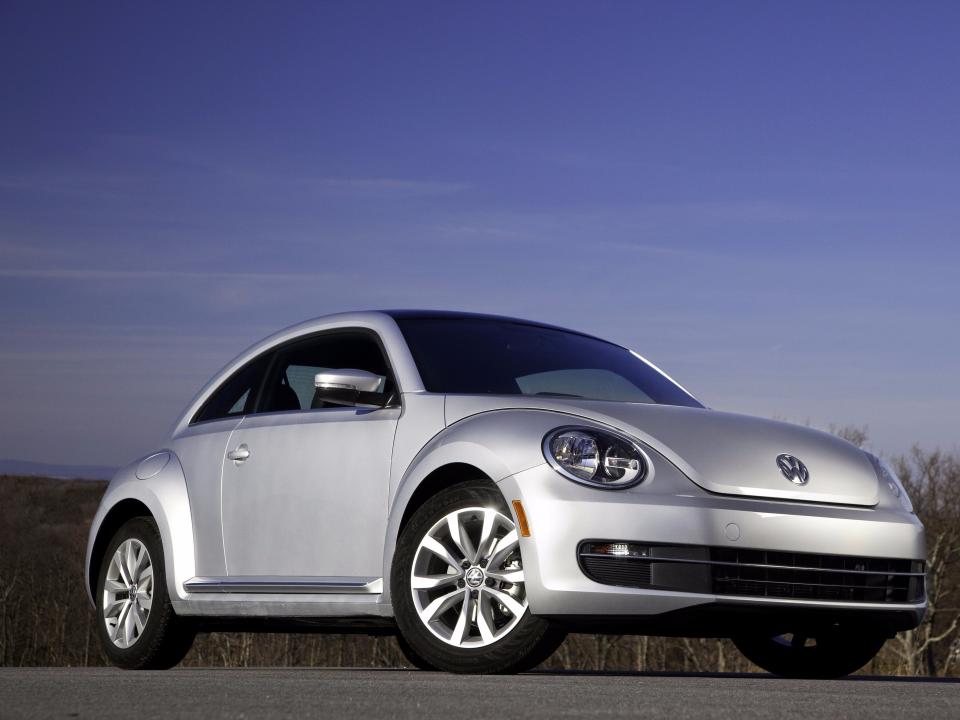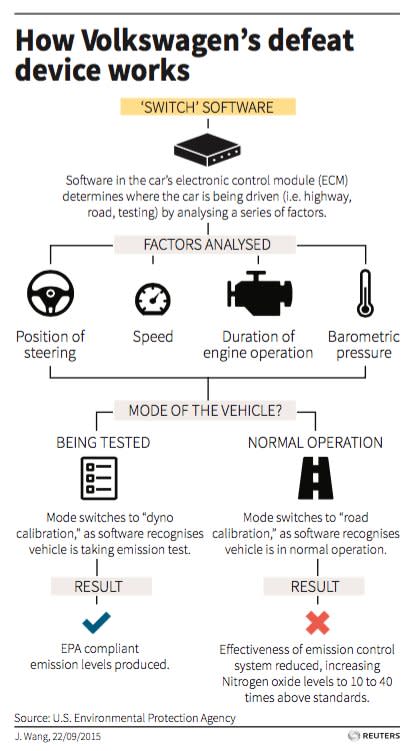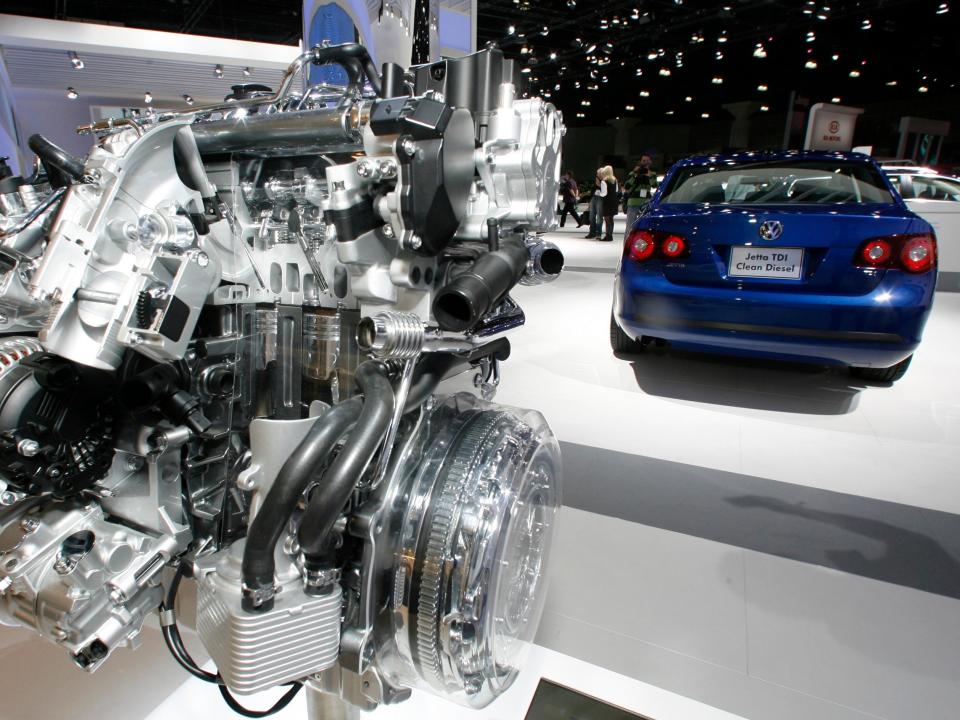Volkswagen's cheating engines can't be easily fixed (vw)

REUTERS/Fabian Bimmer
Volkswagen is confronted with a monumental challenge.
The company has admitted that 11 million of its cars used illegal software to cheat emissions standards.
Now, many owners are demanding that the offending cars be fixed.
That's easier said than done, and Volkswagen's already tried – and failed – twice.
Here's the issue, according to the Environmental Protection Agency: cars with Volkswagen's 2.0 liter TDI turbo-diesel, four-cylinder engines include software that detects when the car is undergoing emissions testing and turns on a suite of pollution control systems.
But as soon as the test ends the controls switch off, leaving the engine free to emit up to 40-times the legal limit of Nitrogen Oxide – a highly polluting gas. According to the California Air Resources Board, or CARB, Volkswagen admitted to using a defeat device during a September 3, 2015 meeting with the agency and the EPA.
The problem for Volkswagen is that getting the engine's emissions in line with pollution standards probably means sacrificing something else.
"Building an engine involves balancing four factors — performance, emissions, durability, and fuel economy," explained Jake Fisher, Consumer Reports' director of automotive testing.
Right now, VW has completely sacrificed emissions to create a TDI engine that offers great performance, incredible fuel economy, and rock solid reliability.
"Whatever the fix is, it will likely sacrifice fuel economy and probably durability as well," Fisher said.
Two failed attempts

REUTERS/Fabian BimmerSo, fixing the cars won't be as simple as changing the software to turn on all of the vehicle's emissions control systems.
"We aren't sure what the exact fix will be," Kelley Blue Book's KBB.com managing editor Matt DeLorenzo told Business Insider. "We also don’t know what kind of performance or fuel economy the car will return when the emissions control is turned on."
Volkswagen actually tried to fix the problem using a software patch in December of 2014 and then again in April of this year.
Neither attempt was successful.
Other options range from the recalibration of pollution control systems to the installation of a Urea injection system that neutralizes NOx and particulates in the exhaust.
And even the installation of a Urea injection system — known commonly as AdBlue — can't guarantee the cars pass emissions. In a letter to VW, the CARB noted that even TDI cars equipped with AdBlue failed the agency emissions tests in May.
The nuclear option
As disquieting as the recent revelations have been, Fisher claims that Consumer Reports' research show that many owners are still perfectly happy with their TDI diesels.
But this is not the case with everyone.

REUTERS/Fabian BimmerThose who purchased their TDI with the belief that they were taking ownership of an environmentally friendly vehicle feel deceived.
On the other hand, those who appreciate the performance, reliability and fuel economy of the TDI will likely not accept a fix that would materially change the characteristics of the car they purchased.
This could lead to the nuclear option — a buy back of all the offending cars.
"Buy backs and forced buy backs enforced through a judgment are highly unusual," attorney Eric Gibbs, who has filed a lawsuit against Volkswagen, told Business Insider.
Buy backs are exceedingly rare in the automotive world because they call for the car company to spend millions if not billions to "buy back" defective cars from owners.
Manufacturers typically avoid this route due to the exorbitant upfront costs and the negative publicity generated by the action.
According to KBB.com's DeLorenzo, there's a 50/50 chance a buy back happens in this case and it all depends on the fix VW comes up with.
"If the change in performance after the fix is minimal then it's not a problem," DeLorenzo said. "But if the change in performance is great, the likelihood of a buy back increases."
If there is buy back of the 482,000 cars in the US, it would be the largest in industry history and cost VW billions of dollars.
Class action lawsuits
VW owners aren't standing idly by. They are taking action through the legal system in the form of class action lawsuits.
"Volkswagen owners feel like they've been misled and deceived," Gibbs told Business Insider. "They thought they were getting a clean diesel and paid a premium for it."
Gibbs, founding partner of Girard Gibbs LLP, is one of the many lawyers representing owners of the 482,000 cars in the US affected by VW's emissions scheme.

REUTERS/Fabian BimmerAccording to Gibbs, more than 50 class action lawsuits have been filed around the country and that number could reach into the hundreds.
In the suit, owners are demanding a buyback or a repair that would not compromise performance, emissions, and fuel economy.
However, the likely outcome here isn't going to be a buy back.
"Typically, settlements involve rebates and certificates that would give owners a discount on a new VW or protection from a drop in resale value," DeLorenzo said.
Either way, there's no easy fix to this problem.
NOW WATCH: Volkswagen faces a possible $18 billion EPA fine for cheating on emissions tests
See Also:

 Yahoo Autos
Yahoo Autos 
